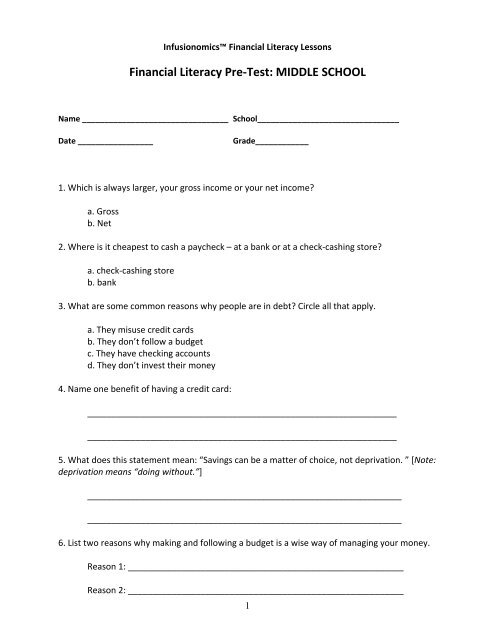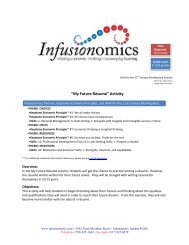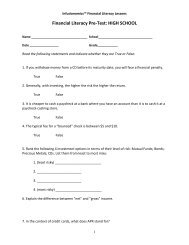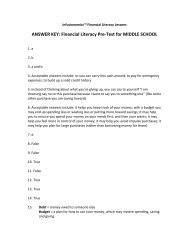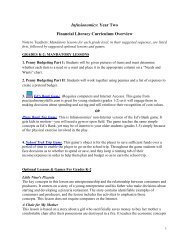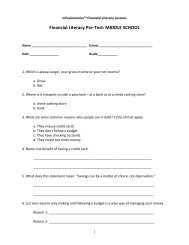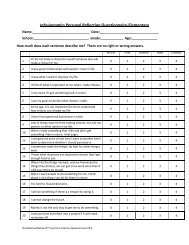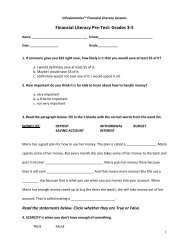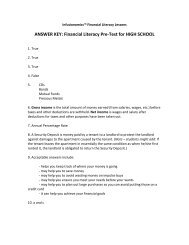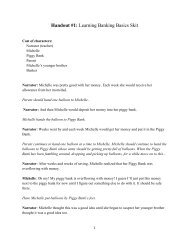Financial Literacy Pre-Test: MIDDLE SCHOOL - Infusionomics
Financial Literacy Pre-Test: MIDDLE SCHOOL - Infusionomics
Financial Literacy Pre-Test: MIDDLE SCHOOL - Infusionomics
- No tags were found...
You also want an ePaper? Increase the reach of your titles
YUMPU automatically turns print PDFs into web optimized ePapers that Google loves.
<strong>Infusionomics</strong> <strong>Financial</strong> <strong>Literacy</strong> Lessons<strong>Financial</strong> <strong>Literacy</strong> <strong>Pre</strong>‐<strong>Test</strong>: <strong>MIDDLE</strong> <strong>SCHOOL</strong>Name _________________________________ School________________________________Date _________________Grade____________1. Which is always larger, your gross income or your net income?a. Grossb. Net2. Where is it cheapest to cash a paycheck – at a bank or at a check‐cashing store?a. check‐cashing storeb. bank3. What are some common reasons why people are in debt? Circle all that apply.a. They misuse credit cardsb. They don’t follow a budgetc. They have checking accountsd. They don’t invest their money4. Name one benefit of having a credit card:________________________________________________________________________________________________________________________________5. What does this statement mean: “Savings can be a matter of choice, not deprivation. ” [Note:deprivation means “doing without.”]__________________________________________________________________________________________________________________________________6. List two reasons why making and following a budget is a wise way of managing your money.Reason 1: _________________________________________________________Reason 2: _________________________________________________________1
7. Which of the following factors affect how much money will accumulate in your savings orinvestment account?a. How early you begin savingb. The interest rate you get on your investmentc. How much money you set aside for savings/investmentsd. All of the aboveRead the statements below and indicate whether they are True or False.8. There is typically a significant charge to set up Direct Deposit at a bank.TRUEFALSE9. How much education you obtain has little bearing on what kind of job you get.TRUEFALSE10. 40% of American households spend more money than they earn.TRUEFALSE11. An Annual Fee is the fee charged by credit card companies when you don’t make yourpayment on time.TRUEFALSE12. APR stands for Annual Percentage Rate.TRUEFALSE13. On average, people with a high school degree make nearly $175/month more than peoplewithout a high school degree.TRUEFALSE14. You have to pay attention to how much money you have in the bank because if you write acheck for money you don’t have in your account, the bank will charge you a fee.TRUEFALSE2
15. Match the words on the left to their correct definitions on the right by drawing a lineconnecting the two:DEBTBUDGETBORROWINTERESTEXPENSEmoney paid regularly, at a particularrate, for the use of borrowed moneythe cost of goods and servicesto receive and use something belongingto somebody else with the intentionof returning itmoney owed to someone elsea plan for how to use your money, whichmay involve spending, saving and giving16. If someone gave you $25 right now, how likely would you be to save at least $10 of it?a. very likelyb. a little bit likelyc. not very likely17. How important do you think it is for you to learn about managing money?a. not very importantb. a little bit importantc. very important18. How much would you say you already know about banks, credit cards, and budgeting?a. I don’t know hardly anything about these topics.b. I know a little bit about these topics.c. I know a good bit about these topics.d. I know a lot about these topics.3


